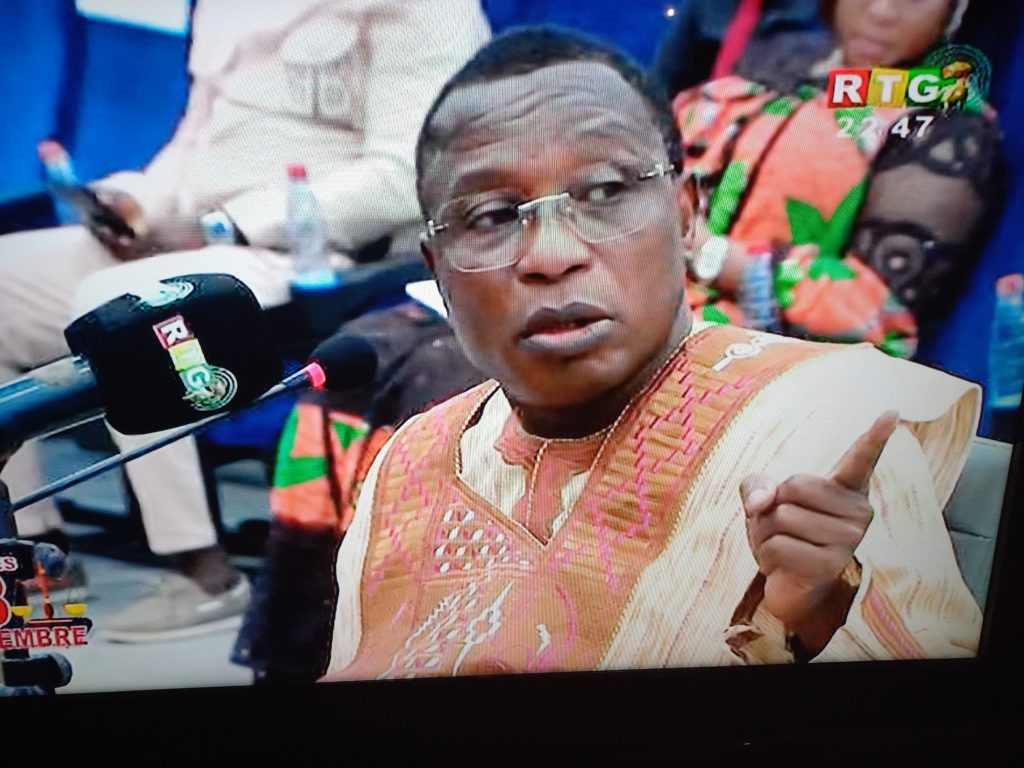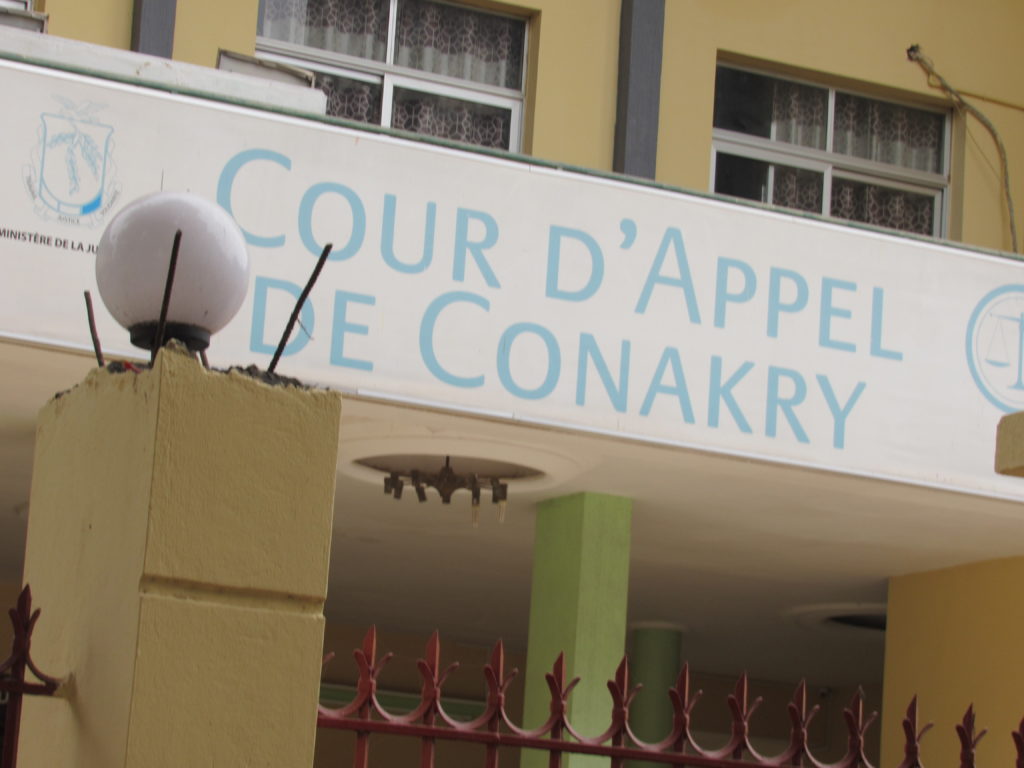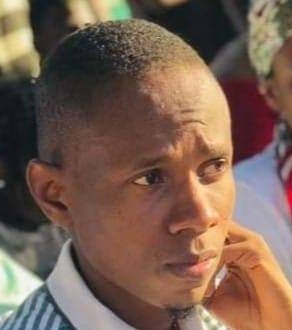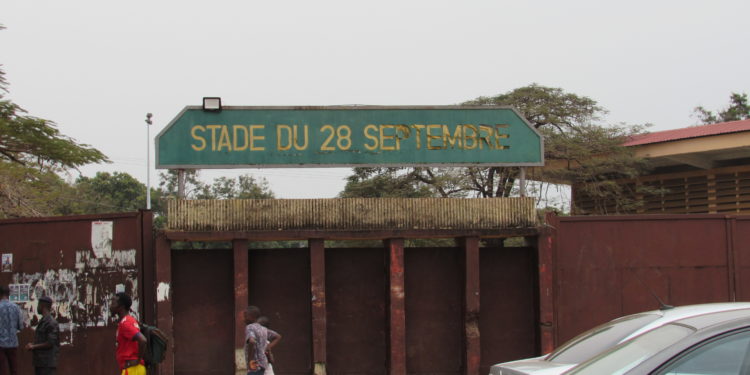By Alpha Diallo in Conakry
The trial of Guinea’s former strongman, Captain Moussa Dadis Camara and his co-accused has taken a break after a riveting nearly three months hearing.
Dadis, as the former military head of state is fondly called, is standing trial alongside 10 other former military colleagues for the massacre of over 150 people on September 28, 2009 in a stadium in Dixinn, a suburb of the capital, Conakry.
The hearing before the criminal court, which sits in the premises of the Court of Appeal of Conakry, began on September 28, 2022, on the 13th anniversary of the event. Dadis is one of about four main suspects in the case, which include his former aide-de-camp, Aboubacar Sidiki Diakité, alias Toumba Diakité, who shot him on the head on December 3, 2009 in a failed assassination bid.
Also on the dock are Colonel Claude Pivi, former minister of presidential security and Colonel Moussa Thiegboro Camara, who was responsible for special forces in charge of the fight against drug.
The men who are all held in Conakry’s maximum security prison, face over a dozen counts charges, including murder, armed robbery, looting, arson, torture, kidnapping and sexual violence.

Dadis was the 9th defendant to face the court. Like the rest of his co-accused, the former head of state pleaded not guilty to all the charges against him. The retired captain took the stand for three days, from Monday 18 December to Tuesday 20 December 2022, during which he spoke of a plot organized by deposed former Guinean President Alpha Condé and others to smear his image to remove him from power.
Dadis became the third head of state of Guinea when he took power on December 24, 2008, following the sudden death of President Lansana Conté two days earlier.
An economist by qualification, Dadis joined the Guinean army in 1990 as a corporal. He served as part of a Guinean contingent of the United Nations Peacekeeping Mission in Sierra Leone from 2001 to 2002. Prior to his assumption of power, he was head of a unit in the army that was responsible to supply fuel.
Dadis reportedly played a leading role in the May 2008 army mutiny inspired by pay arrears. His National Council for Democracy and Development (NCDD) junta was received with mixed feelings, as some Guineans, fed up with Conte’s 24-year-long rule, welcomed a change of guards. But it soon emerged that the junta, which had been considered as saviours, wanted to stay on.
On September 28, 2009, some leading opposition political parties staged a rally during which they sought to denounce the alleged plan of Dadis to run for president in the 2010 election.
During the rally in the Stadium, which coincidentally was named Stade du Septembre 28 during the Sekou Toure era, armed soldiers descended on the protesters, shooting indiscriminately. Some 157 people were reportedly killed, according to rights groups. And 109 women were also reported raped, while hundreds of people were wounded or missing, according to the campaigners.
Among those who disappeared was the father of Bailo Bah. He told ManoReporters that they expected the trial to unearth the truth of what happened to his father and other victims, including issues related to the identification of dozens of bodies buried in mass graves.
“We also hope that the State, through the Ministry of Justice and Human Rights, will initiate reparation mechanisms for orphans, widows, survivors and guarantee the non-repetition of such a tragedy,” said Mr Bah.

The commencement of the trial ended a long wait for justice for Bailo and the hundreds of victims and their families. The hearings therefore attracted huge public attention. The court which initially sat in the Criminal Court of DIXINN, was relocated to the premises of the Court of Appeal for want of space to accommodate the crowd that pours in to witness the proceedings.
After Dadis was shot, he was flown to Morocco for medical treatment. He would later relocate to Burkina Faso, where he lived in exile until his voluntary return earlier this year to face justice and clear his name.
The circumstances surrounding the shooting of Dadis has been a topical issue both in and outside the court. While he claimed it was part of a plot to remove him from power, Toumba, the man who shot him, claimed he did so because Dadis wanted to frame him for the massacre.
Dadis was succeeded by his then Number 2, General Sékouba Konaté, who served as Transition President from December 2009 to December 2010, presiding over Guinea’s first ever democratically held elections. That election, which brought in Alpha Conde, promised a new beginning for many Guineans. However, one of the many promises the Conde administration failed to deliver on, in the views of many of his critics, is to provide justice to victims.
Alseny Sall, a spokesman for the Guinean Organization for the Defense of Human and Citizens’ Rights (OGDH), hailed the commencement of the trial as an “important step.”
“We remain on our guard because, as you know, the opening of this historic trial is an important step to allow the victims we are supporting to obtain justice in this case after more than 13 years of fighting for justice. What we are waiting for is the manifestation of the truth in order to allow the victims to obtain justice so that [it] never [happens] again in Guinea. For us, this trial must serve as a lesson beyond Guinea,” he told ManoReporters.

He wants to know circumstances surrounding his
disappearance. Photo credit, Alpha Diallo, ManoReporters.
The ousting of Conde in 2021 paved way for the setting up of the tribunal by current transition president Mamady Doumbouya.
The accused face lengthy jail terms if found guilty, including for some of them a minimum of 30 years and up to life in jail.
The hearing has been electrifying, sometimes invoking sad feelings because of the testimonies of brutality, and sometimes funny, as the accused try to apportion blame to each other in their testimonies.
The exchange has been mainly between Dadis and Toumba. Their testimonies have turned them into Tik Tok sensations, as young Guineans turn their speeches into parody.
But sometimes the hearing took a heated turn, like when Dadis got angered by the prosecutor’s description of his regime as dictatorial. In response, he said that what he did in a short time has never been done in 10 years by any other regime in the country.
According to Dadis, Condé, then a veteran opposition leader and General Konaté conspired to orchestrate the massacre to remove him from power. He claimed that Toumba was the executor of the plan, assigned to eliminate him. Dadis also accused Toumba of presiding over the massacre of the civilians.
Toumba, in his defence, said he went to the stadium only to save the political leaders, after realizing a plot by Dadis’ men to brutalize them.
When the hearing resumes on January 9th, 2023, Dadis’ lawyers would want to see the appearance of General Konaté, who was Minister of Defense at the time of the incident.






















